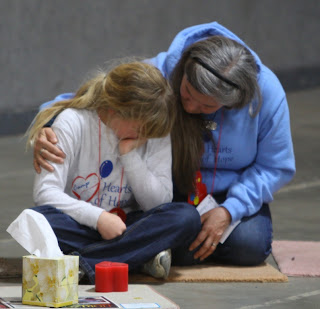By Coral Popowitz, Executive Director of Children's Grief Connection
We tell all our new camp volunteers, and remind some of the veterans, not to assume or presume, not to fix or fixate on the campers or teens but just to simply (not easily but simply) ‘meet them where they are.’ Approach them from wherever they are in their developmental growth, their grief process or their emotional journey, - not where we want them to be but to meet them where they are.
I tell camper families that around 75% of our campers and teens don’t want to come to a grief camp, whether they think they’re going to ‘cry all weekend’ or ‘not make any friends’ whether it’s the first time they’ve slept overnight away from home or they would rather not talk about it at all, ever again; they are not ‘happy campers’ when they arrive. I also tell the families that 95% of the campers and teens don’t want to leave on Sunday!
With just 36 short hours between first meeting them and saying goodbye, we are singing silly songs in the gym and then sharing their loved one’s story along with their tears and laughter, we are running from place to place and from activity to activity; mostly we are forming connections, understanding we are all experiencing grief and love for those we have lost.
We tell the campers and teens all feelings are okay. Sometimes they don’t want to share, or cry, or laugh, perhaps they just don’t want to be away from home, away from their family or friends, that’s okay. Sometimes they don’t want to drum or be in a skit; sometimes making a memory project is not what they feel like doing, that’s okay. It’s okay because there is always something, someone, some activity that they do enjoy - if we meet them where they are, accept their feelings and help them work through their fears and concerns; they move forward in their grief, we bring hope and healing.
As helpers we work hard to get all the campers involved and participating in all the activities at camp and are concerned when they are particularly quiet or inattentive, refusing to participate, yearning to leave or anxious about the next thing on the schedule. Most of the time, by camp’s end the transformation is obvious (the 95% who don’t want to leave) and there are those 5% who may not have connected, may not have enjoyed their time…and yet later, a phone call from a family member, a social worker, a teacher will let us know that despite what we may have thought we did make a difference, despite what we thought, despite how it appeared, and because we always meet them where they are and accept their feelings, it all turns out okay, hope and healing does happen for 100% of our campers and teens.






